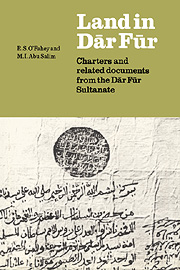Book contents
- Frontmatter
- Contents
- Preface and acknowledgements
- List and concordance of documents
- Transliteration and abbreviations
- Chapter 1 The Dār Fūr Sultanate
- Chapter 2 Estate and privilege
- Chapter 3 Literacy and Chancery
- Chapter 4 A Diplomatic Commentary
- Chapter 5 Translations and Commentary
- Sources and bibliography
- Notes
- Indices
Chapter 1 - The Dār Fūr Sultanate
Published online by Cambridge University Press: 16 November 2009
- Frontmatter
- Contents
- Preface and acknowledgements
- List and concordance of documents
- Transliteration and abbreviations
- Chapter 1 The Dār Fūr Sultanate
- Chapter 2 Estate and privilege
- Chapter 3 Literacy and Chancery
- Chapter 4 A Diplomatic Commentary
- Chapter 5 Translations and Commentary
- Sources and bibliography
- Notes
- Indices
Summary
Introduction
The Dār Fūr sultanate was an African kingdom and a Muslim state; one polity among many in the Sudanic Belt, the vast zone below the Sahara stretching from the Atlantic Ocean to the Red Sea. It thus lay in that part of Africa that has been exposed for over a thousand years to influences from the Mediterranean and Muslim worlds to the north. Within the Sudanic Belt, Dār Fūr itself lay open to immigration and ideas coming from both West Africa and the Nile valley. The outlines of the sultanate's political history in the eighteenth and nineteenth centuries are reasonably well-known, as are the state's central administrative structures. But its economic and social history is only now beginning to be uncovered both through Arabic documents of the type presented here and through the systematic collection of local oral traditions.
The origins of the Dār Fūr sultanate are obscure; the original nucleus of the state was a Fur kingdom based upon the Marra Mountains of central Dār Fūr and the lands immediately to the west. Its roots may go back to the fifteenth century. The oral traditions of Dār Fūr record a long tradition of state formation in the area; two empires or states, those of the Daju and Tunjur, are said to have preceded that of the Fur. The Marra Mountains were the ancestral home of the Fur, a people with their own complex language and culture and with no obvious linguistic affinities with their neighbours.
- Type
- Chapter
- Information
- Land in Dar FurCharters and Related Documents from the Dar Fur Sultanate, pp. 1 - 11Publisher: Cambridge University PressPrint publication year: 1983



